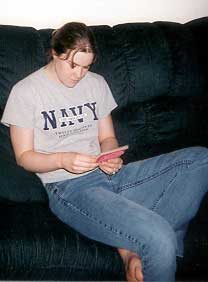Study Tips & Tools
New Terms
Tips for learning the language of science
It sounds silly, but you learn as many new words in an A&P course as you do a beginning foreign language course. Really—there’s been research to prove it!
The easiest way to learn new terms is to use the flash card method. Yes . . . it reminds us all of elementary school, I know. But I also know that it works in college —I still use it myself. In fact, it was a college professor at St. Louis University (Dr. Steve Dina, my ecology professor) who taught me how valuable a tool this can be in a college science course when I went to him asking for help with the overwhelming terminology.
![]() TIP—also visit the Lion Den Learning Terminology page
TIP—also visit the Lion Den Learning Terminology page
Here’s how it works. It’s so easy . . .
First, get in the mindset of looking for new words. I mean really stop and look at them . . . don’t just pass them by. But don’t stop too long —you have to do something for this to work.
Next, write the new term down on an index card.
|
Carbaminohemoglobin |
You always have a few blank index cards in your pocket, don’t you? (No? Then start!)
Next, turn the card over and write the meaning (you may have to look in your notes or the textbook).
|
A form of hemoglobin (a red protein in red blood cells) that carries carbon dioxide |
 Just doing that much will get you started. But you’re not there yet . . .
Just doing that much will get you started. But you’re not there yet . . .
Next, carry your growing stack of cards with you. Everywhere. School, shopping, hanging out with friends, parties, ball games . . .even the bathtub. I’m not kidding.
Then, when you have a moment or two while you’re waiting in line for your cheeseburger, or during a commercial on TV, or while soaking in the tub, take out the stack and look at it.
Don’t concentrate too hard. Just read the term on the top card. Try to guess its meaning. Then flip over the card and see if you’re right. If you are —great. If not, oh well, better luck next time. Just keep doing it over and over and over. But only a few minutes at a time.
Before you know it, without trying very hard at all, you’ll know all those new words!
Tip: Try learning them by looking at the description and try to guess the term.
Advanced flash card strategies
I’ve had students over the years who’ve really made an art form of this technique. You can use your cards to really help you understand the “big picture” in which your new terms fit by adding some additional features to your card:
|
Carbaminohemoglobin A form of hemoglobin (a red protein in red blood cells) that carries carbon dioxide (attached to amino acids) Chapter 17, 24 |
In the above example, the word is “dissected” by using a highlighter to relate the word parts to the definition. The student has also added a pronunciation guide and a key to which chapters in the textbook the concept has appeared to be important. Notice that this definition has a little more information than the earlier example. When you learn more about a term, then add to your card for that term!
Some other “advanced” flash card options
Draw or paste pictures to your card
Use cards of different colors for different systems of the body (or to distinguish structures from functions . . . or any other code that helps you learn faster)
Lay out cards in groups to show how the terms/concepts relate to one another (see concept maps)
Have card “trading sessions” where you compare cards with other students to make sure you haven’t missed something or to learn other ways to use your cards.
Use a computer program such as studyPerfect to generate online flashcards (or print them out and use them like traditional flash cards)
—thanks to Michelle Noel for this tip!
Other automated options:
Video Summary
Here’s a short video summarizing some of the strategies outlined above.
Additional tips and resources
Lion Den Learning Terminology page
The A&P Student terminology tips 
Using Flash Cards as a Study Skill Another take on the flash card process
Flash!–Unleash Your Memory Computer program (with free 30-day trial) that automates the flash card process
|
“Concepts are embedded in words.” |
Last updated: May 21, 2022 at 13:54 pm